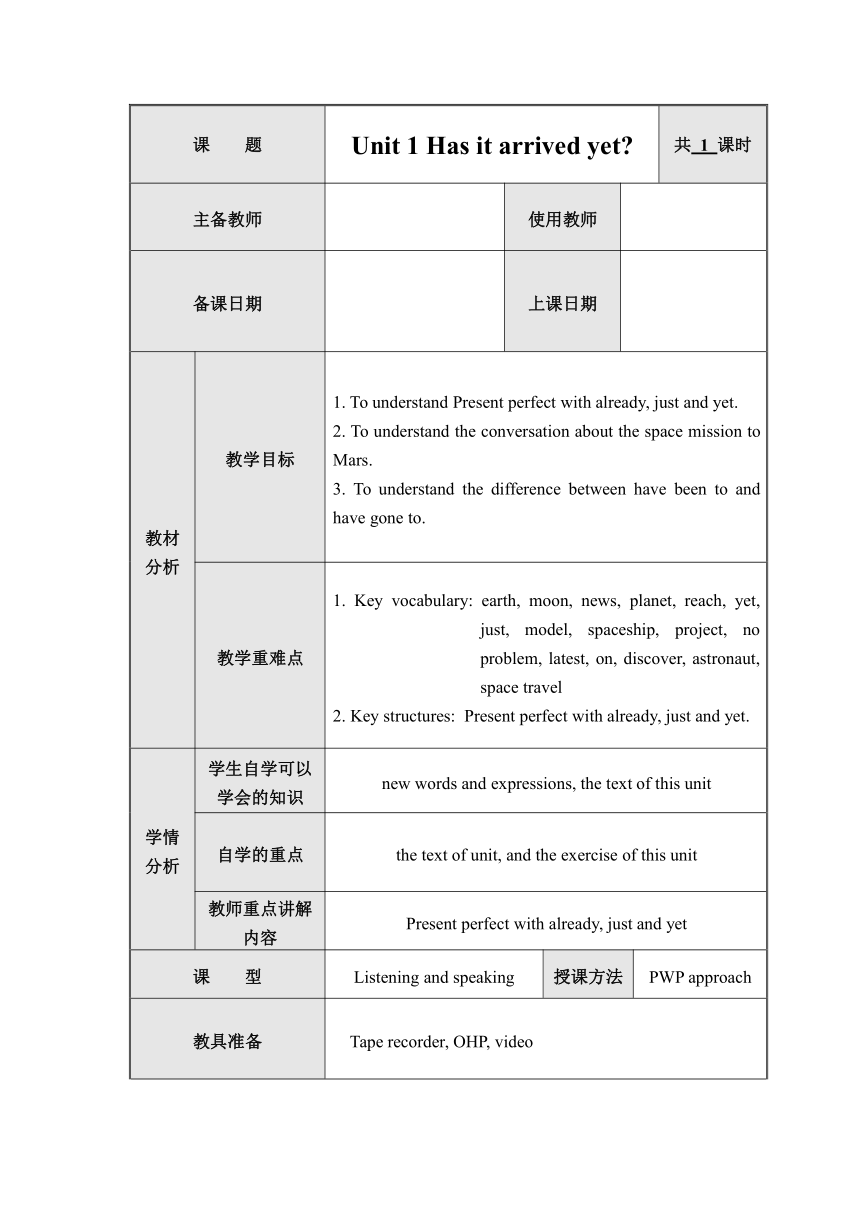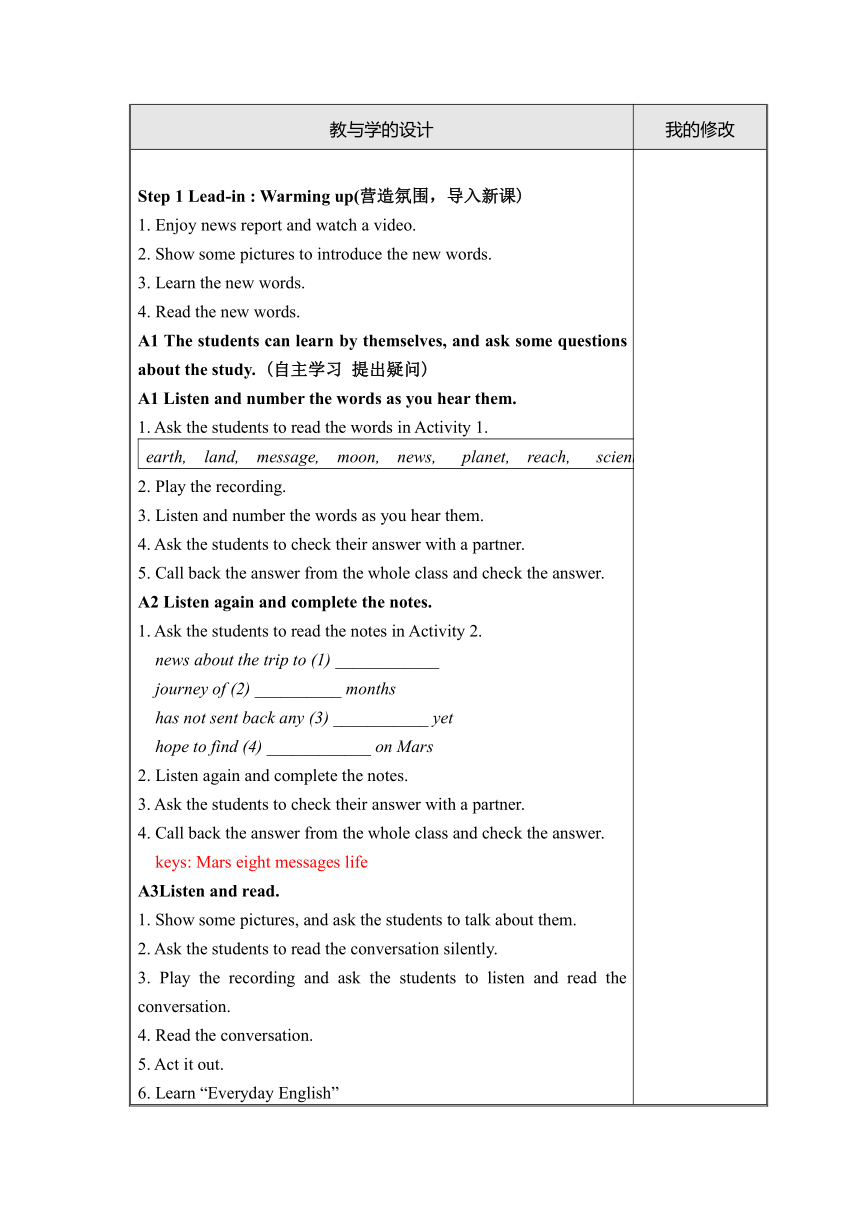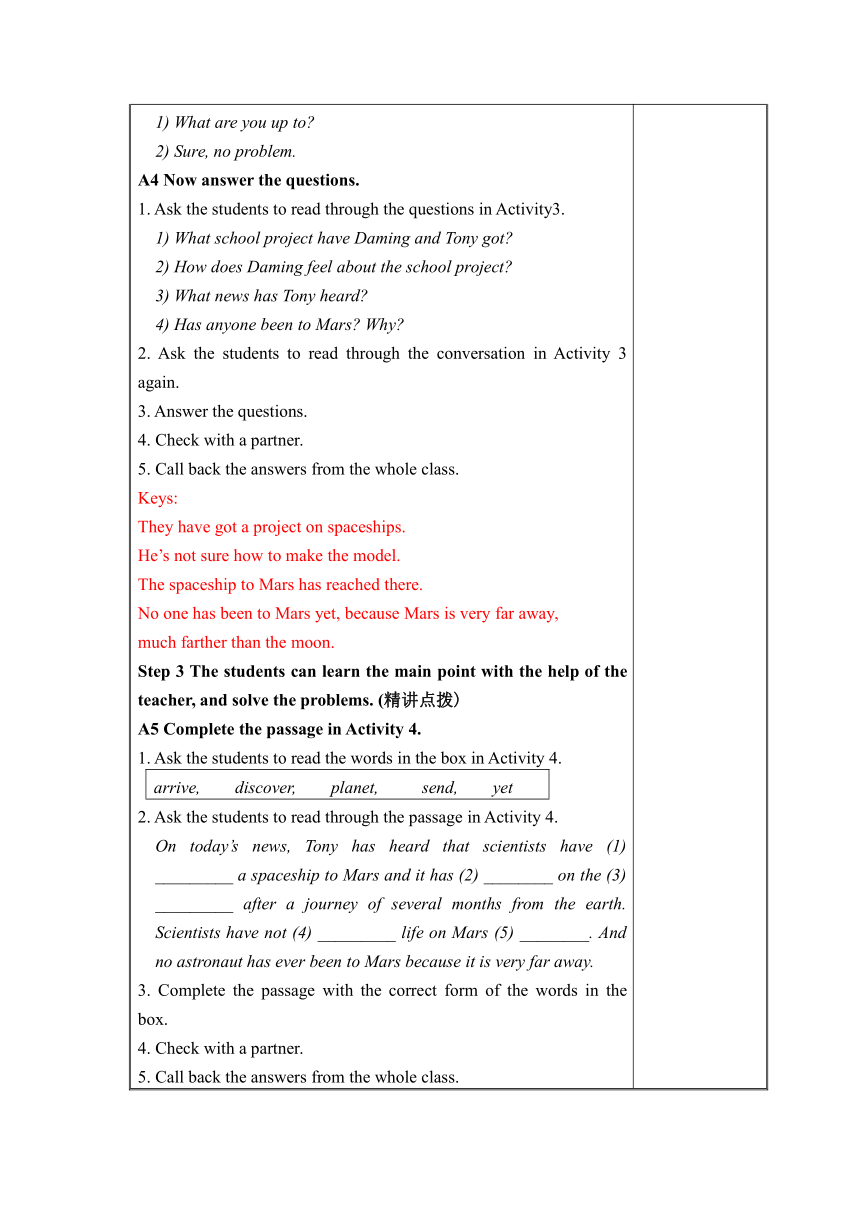《Module 3 Journey to space Unit 1 Has it arrived yet?》教案
文档属性
| 名称 | 《Module 3 Journey to space Unit 1 Has it arrived yet?》教案 |

|
|
| 格式 | zip | ||
| 文件大小 | 15.6KB | ||
| 资源类型 | 教案 | ||
| 版本资源 | 外研版 | ||
| 科目 | 英语 | ||
| 更新时间 | 2015-09-15 00:00:00 | ||
图片预览




文档简介
电子教案
年级:
学科:
教师:
课 题 Unit 1 Has it arrived yet 共 1 课时
主备教师 使用教师
备课日期 上课日期
教材分析 教学目标 1. To understand Present perfect with already, just and yet.2. To understand the conversation about the space mission to Mars.3. To understand the difference between have been to and have gone to.
教学重难点 1. Key vocabulary: earth, moon, news, planet, reach, yet, just, model, spaceship, project, no problem, latest, on, discover, astronaut, space travel2. Key structures: Present perfect with already, just and yet.
学情分析 学生自学可以学会的知识 new words and expressions, the text of this unit
自学的重点 the text of unit, and the exercise of this unit
教师重点讲解内容 Present perfect with already, just and yet
课 型 Listening and speaking 授课方法 PWP approach
教具准备 Tape recorder, OHP, video
教与学的设计 我的修改
Step 1 Lead-in : Warming up(营造氛围,导入新课)1. Enjoy news report and watch a video.2. Show some pictures to introduce the new words.3. Learn the new words.4. Read the new words.A1 The students can learn by themselves, and ask some questions about the study. (自主学习 提出疑问)A1 Listen and number the words as you hear them.1. Ask the students to read the words in Activity 1.earth, land, message, moon, news, planet, reach, scientist2. Play the recording.3. Listen and number the words as you hear them.4. Ask the students to check their answer with a partner.5. Call back the answer from the whole class and check the answer.A2 Listen again and complete the notes.1. Ask the students to read the notes in Activity 2.news about the trip to (1) ____________journey of (2) __________ monthshas not sent back any (3) ___________ yethope to find (4) ____________ on Mars2. Listen again and complete the notes.3. Ask the students to check their answer with a partner.4. Call back the answer from the whole class and check the answer. keys: Mars eight messages lifeA3Listen and read.1. Show some pictures, and ask the students to talk about them.2. Ask the students to read the conversation silently.3. Play the recording and ask the students to listen and read the conversation.4. Read the conversation.5. Act it out.6. Learn “Everyday English”1) What are you up to 2) Sure, no problem.A4 Now answer the questions.1. Ask the students to read through the questions in Activity3.1) What school project have Daming and Tony got 2) How does Daming feel about the school project 3) What news has Tony heard 4) Has anyone been to Mars Why 2. Ask the students to read through the conversation in Activity 3 again.3. Answer the questions.4. Check with a partner.5. Call back the answers from the whole class.Keys: They have got a project on spaceships.He’s not sure how to make the model.The spaceship to Mars has reached there.No one has been to Mars yet, because Mars is very far away, much farther than the moon.Step 3 The students can learn the main point with the help of the teacher, and solve the problems. (精讲点拨)A5 Complete the passage in Activity 4.1. Ask the students to read the words in the box in Activity 4.arrive, discover, planet, send, yet2. Ask the students to read through the passage in Activity 4.On today’s news, Tony has heard that scientists have (1) _________ a spaceship to Mars and it has (2) ________ on the (3) _________ after a journey of several months from the earth. Scientists have not (4) _________ life on Mars (5) ________. And no astronaut has ever been to Mars because it is very far away.3. Complete the passage with the correct form of the words in the box.4. Check with a partner.5. Call back the answers from the whole class.Keys: 1. sent 2. arrived 3. planet 4. discovered 5. yet6. Read the passage together.Step 4 Effective practice, consolidate the knowledge(训练巩固)A. 中考链接: ( ) 1. —Where’s Ben (2011福州) —He______ to the teachers’ office. He’ll be back soon. A. go B. has gone C. has been ( ) 2. —Will you please go to see the movie Guanyinshan with me —No, I won’t. I ______ it already. (2011聊城)A. saw B. have seen C. see D. will see ( ) 3. She isn’t at the cinema now because she _________the library. (2011南宁) A. has been to B. have been to C. have gone to D. has gone to( ) 4. —Jim isn’t in the classroom. Where is he —He _______to the teacher’s office. (2011武汉)A. will go B. has gone C. had gone D. is going ( ) 5. —I’d like you to tell me something about Shen Nongjia.—I’m sorry, but neither Jack nor I ______ there.( 2013湖北孝感市)A. have been B. has been C. have gone D. has goneKeys: 1. B 2. B 3. D 4.B 5. AB. 完成句子:1. 我们已经到达上海。 We __________________ Shanghai.2. 他刚刚做完这个模型。 He ____________ this model.3. 这个女孩在干什么? What _____ this girl ____________ 4. —你曾经去过香港吗?—是的。 —_____ you ___________ Hong Kong —Yes, I _____.5. 他们听说过这个最近的新闻吗? Have they ___________________ Keys: 1. have already reached 2. has just made 3. is, up to 4. Have, ever been to, have 5. heard this latest newsstep 5 Summary evaluation, leak turnover(总结评价,查漏补缺)Language points.What are you up to 你在做什么呢?be up to 表示“正在做某事,忙于某事”。常用在非正式常合中。e.g. What’s he up to with all those books on the floor 地上放那么多书,他在干什么呢?What were you up to yesterday You didn’t answer my phone. 昨天你干什么呢?不接我电话。当我们说be up to sb.时,表示“由……决定”。e.g. Do you want to stay or go It’s up to you. 你是要留下还是要走?你自己定。2. I’ve just made this model of the space station.这是我刚做的宇宙空间站的模型。just 常用在现在完成时的肯定句中,常放在助动词 have/has 的后面。e.g. We’ve just seen/watched the film. 我们刚看了电影。3. I haven’t started it yet. 我还没有开始做呢。yet表示“还(末)”,常用在现在完成时的否定句中,通常放在句末。 e.g. We haven’t finished our homework yet. 我们还没有完成作业。4. Have you heard the latest news 你听说过这个最新消息吗? latest adj. 最近的;最新的e.g. The news is all about the latest meeting.
这条消息是关于最近的会议的。5. That’s why it’s on the news. 这就是它为什么出现在新闻报导的原因。That’s why… 这就是……的原因e.g. That’s why they didn’t like the music. 这就是他们不喜欢这个音乐的原因。 on prep. 在(播放)中;关于…… e.g. What’s on the TV 电视正在播放什么节目?6. So have they discovered life on Mars 所以他们在火星上发现生命了吗? discover v. 发现;找到e.g. The fact is that he did not discover it. 事实是他没有发现它。7. Astronauts have already been to the moon. 宇航员已经去过月球了。already表示“已经”,常放在have/ has之后,通常用于肯定句中。e.g. Jack has already finished his homework. have/ has been to表示曾经去过某地,但现在已经回到他的生活所在地。e.g. They’ve already been to Suzhou twice. 他们已经去过苏州两次了。just/already/yet用法小结just “刚刚”;already “已经”,一般置于have/has之后,两者都用于肯定句;yet 用在否定句和疑问句,表示“还未”。have been to 表示“去过某地”,但现在已经回来了; have gone to 表示“去了某地”,现在不在这里(说话人所在地)。
作业布置 1.copy the new words and expressions2.recite the text of the unit 1.3.finish the workbook4.recite the notes and exercise points.
板书设计 Unit 1 Has it arrived yet .earth, moon, news, planet, reach, yet, just, model, alreadyspaceship, project, latest, yeton, discover, astronaut, ever
课后反思
年级:
学科:
教师:
课 题 Unit 1 Has it arrived yet 共 1 课时
主备教师 使用教师
备课日期 上课日期
教材分析 教学目标 1. To understand Present perfect with already, just and yet.2. To understand the conversation about the space mission to Mars.3. To understand the difference between have been to and have gone to.
教学重难点 1. Key vocabulary: earth, moon, news, planet, reach, yet, just, model, spaceship, project, no problem, latest, on, discover, astronaut, space travel2. Key structures: Present perfect with already, just and yet.
学情分析 学生自学可以学会的知识 new words and expressions, the text of this unit
自学的重点 the text of unit, and the exercise of this unit
教师重点讲解内容 Present perfect with already, just and yet
课 型 Listening and speaking 授课方法 PWP approach
教具准备 Tape recorder, OHP, video
教与学的设计 我的修改
Step 1 Lead-in : Warming up(营造氛围,导入新课)1. Enjoy news report and watch a video.2. Show some pictures to introduce the new words.3. Learn the new words.4. Read the new words.A1 The students can learn by themselves, and ask some questions about the study. (自主学习 提出疑问)A1 Listen and number the words as you hear them.1. Ask the students to read the words in Activity 1.earth, land, message, moon, news, planet, reach, scientist2. Play the recording.3. Listen and number the words as you hear them.4. Ask the students to check their answer with a partner.5. Call back the answer from the whole class and check the answer.A2 Listen again and complete the notes.1. Ask the students to read the notes in Activity 2.news about the trip to (1) ____________journey of (2) __________ monthshas not sent back any (3) ___________ yethope to find (4) ____________ on Mars2. Listen again and complete the notes.3. Ask the students to check their answer with a partner.4. Call back the answer from the whole class and check the answer. keys: Mars eight messages lifeA3Listen and read.1. Show some pictures, and ask the students to talk about them.2. Ask the students to read the conversation silently.3. Play the recording and ask the students to listen and read the conversation.4. Read the conversation.5. Act it out.6. Learn “Everyday English”1) What are you up to 2) Sure, no problem.A4 Now answer the questions.1. Ask the students to read through the questions in Activity3.1) What school project have Daming and Tony got 2) How does Daming feel about the school project 3) What news has Tony heard 4) Has anyone been to Mars Why 2. Ask the students to read through the conversation in Activity 3 again.3. Answer the questions.4. Check with a partner.5. Call back the answers from the whole class.Keys: They have got a project on spaceships.He’s not sure how to make the model.The spaceship to Mars has reached there.No one has been to Mars yet, because Mars is very far away, much farther than the moon.Step 3 The students can learn the main point with the help of the teacher, and solve the problems. (精讲点拨)A5 Complete the passage in Activity 4.1. Ask the students to read the words in the box in Activity 4.arrive, discover, planet, send, yet2. Ask the students to read through the passage in Activity 4.On today’s news, Tony has heard that scientists have (1) _________ a spaceship to Mars and it has (2) ________ on the (3) _________ after a journey of several months from the earth. Scientists have not (4) _________ life on Mars (5) ________. And no astronaut has ever been to Mars because it is very far away.3. Complete the passage with the correct form of the words in the box.4. Check with a partner.5. Call back the answers from the whole class.Keys: 1. sent 2. arrived 3. planet 4. discovered 5. yet6. Read the passage together.Step 4 Effective practice, consolidate the knowledge(训练巩固)A. 中考链接: ( ) 1. —Where’s Ben (2011福州) —He______ to the teachers’ office. He’ll be back soon. A. go B. has gone C. has been ( ) 2. —Will you please go to see the movie Guanyinshan with me —No, I won’t. I ______ it already. (2011聊城)A. saw B. have seen C. see D. will see ( ) 3. She isn’t at the cinema now because she _________the library. (2011南宁) A. has been to B. have been to C. have gone to D. has gone to( ) 4. —Jim isn’t in the classroom. Where is he —He _______to the teacher’s office. (2011武汉)A. will go B. has gone C. had gone D. is going ( ) 5. —I’d like you to tell me something about Shen Nongjia.—I’m sorry, but neither Jack nor I ______ there.( 2013湖北孝感市)A. have been B. has been C. have gone D. has goneKeys: 1. B 2. B 3. D 4.B 5. AB. 完成句子:1. 我们已经到达上海。 We __________________ Shanghai.2. 他刚刚做完这个模型。 He ____________ this model.3. 这个女孩在干什么? What _____ this girl ____________ 4. —你曾经去过香港吗?—是的。 —_____ you ___________ Hong Kong —Yes, I _____.5. 他们听说过这个最近的新闻吗? Have they ___________________ Keys: 1. have already reached 2. has just made 3. is, up to 4. Have, ever been to, have 5. heard this latest newsstep 5 Summary evaluation, leak turnover(总结评价,查漏补缺)Language points.What are you up to 你在做什么呢?be up to 表示“正在做某事,忙于某事”。常用在非正式常合中。e.g. What’s he up to with all those books on the floor 地上放那么多书,他在干什么呢?What were you up to yesterday You didn’t answer my phone. 昨天你干什么呢?不接我电话。当我们说be up to sb.时,表示“由……决定”。e.g. Do you want to stay or go It’s up to you. 你是要留下还是要走?你自己定。2. I’ve just made this model of the space station.这是我刚做的宇宙空间站的模型。just 常用在现在完成时的肯定句中,常放在助动词 have/has 的后面。e.g. We’ve just seen/watched the film. 我们刚看了电影。3. I haven’t started it yet. 我还没有开始做呢。yet表示“还(末)”,常用在现在完成时的否定句中,通常放在句末。 e.g. We haven’t finished our homework yet. 我们还没有完成作业。4. Have you heard the latest news 你听说过这个最新消息吗? latest adj. 最近的;最新的e.g. The news is all about the latest meeting.
这条消息是关于最近的会议的。5. That’s why it’s on the news. 这就是它为什么出现在新闻报导的原因。That’s why… 这就是……的原因e.g. That’s why they didn’t like the music. 这就是他们不喜欢这个音乐的原因。 on prep. 在(播放)中;关于…… e.g. What’s on the TV 电视正在播放什么节目?6. So have they discovered life on Mars 所以他们在火星上发现生命了吗? discover v. 发现;找到e.g. The fact is that he did not discover it. 事实是他没有发现它。7. Astronauts have already been to the moon. 宇航员已经去过月球了。already表示“已经”,常放在have/ has之后,通常用于肯定句中。e.g. Jack has already finished his homework. have/ has been to表示曾经去过某地,但现在已经回到他的生活所在地。e.g. They’ve already been to Suzhou twice. 他们已经去过苏州两次了。just/already/yet用法小结just “刚刚”;already “已经”,一般置于have/has之后,两者都用于肯定句;yet 用在否定句和疑问句,表示“还未”。have been to 表示“去过某地”,但现在已经回来了; have gone to 表示“去了某地”,现在不在这里(说话人所在地)。
作业布置 1.copy the new words and expressions2.recite the text of the unit 1.3.finish the workbook4.recite the notes and exercise points.
板书设计 Unit 1 Has it arrived yet .earth, moon, news, planet, reach, yet, just, model, alreadyspaceship, project, latest, yeton, discover, astronaut, ever
课后反思
同课章节目录
- Module 1 Feelings and impressions
- Unit 1 It smells delicious.
- Unit 2 I feel nervous when I speak Chinese .
- Unit 3 Language in use
- Module 2 Experiences
- Unit 1 I've also entered lots of speaking competi
- Unit 2 They have seen the Pyramids.
- Unit 3 Language in use
- Module 3 Journey to space
- Unit 1 Has it arrived yet?
- Unit 2 We have not found life on any other planet
- Unit 3 Language in use
- Module 4 Seeing the docto
- Unit 1 I haven't done much exercise since I got m
- Unit 2 We have played football for a year now
- Unit 3 Language in use
- Module 5 Cartoons
- Unit 1 It's time to watch a cartoon.
- Unit 2 Tintin has been popular for over eighty yea
- Unit 3 Language in use
- Revision module A
- Module 6 Hobbies
- Unit 1 Do you collect anything ?
- Unit 2 Hobbies can make you grow as a person.
- Unit 3 Language in use
- Module 7 Summer in Los Angeles
- Unit 1 Please write to me and send me some photos
- Unit 2 Fill out a form and come to learn English
- Unit 3 Language in use
- Module 8 Time off
- Unit 1 I can hardly believe we are in the city ce
- Unit 2 We thought somebody was moving about
- Unit 3 Language in use
- Module 9 Friendship
- Unit 1 Could I ask if you've mentioned this to he
- Unit 2 I believe that the world is what you think
- Unit 3 Language in use
- Module 10 On the radio
- Unit 1 I hope that you can join us one day
- Unit 2 It seemed that they were speaking to me in
- Unit 3 Language in use
- Revision module B
